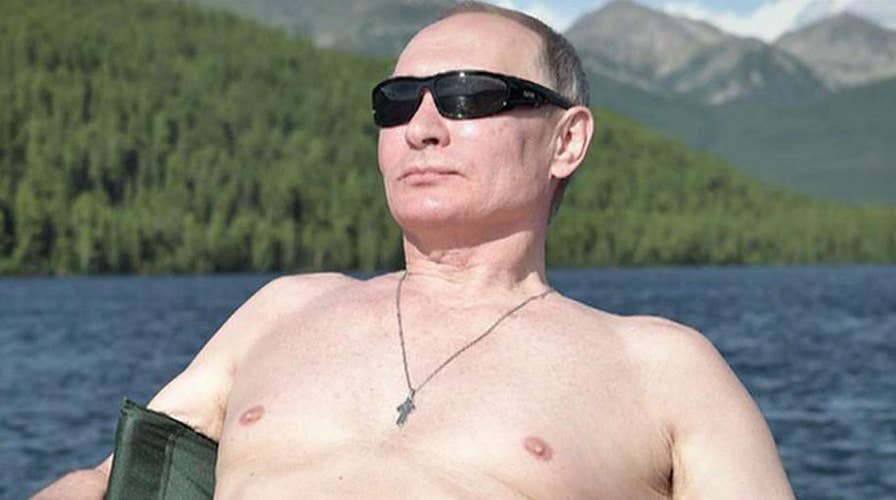As sure as the dog days of August, photos from Putin’s summer holidays have arrived. Whether he’s riding horses, wrestling tigers, or this year, fishing with his buddies - donning underwater camouflage to sneak up on Siberian Pike - “what Putin did on his summer vacation” makes for entertaining propaganda.
Strangely, we haven’t seen many photos of Putin and his Judo sparring partners lately, enjoying a sport he has said helped to “drag him off the streets.” Perhaps the pictures would reveal too much about how he approaches the world.
Let me explain: the maxim of Judo’s 19th century founder, “maximum efficiency with minimal effort,” is one that Putin would have learned as a young student of the martial art in St. Petersburg. It’s also a principle that’s perfectly suited for leading 21st century Russia.
The country’s population is declining. Oil prices are likely to remain depressed. Endemic corruption hinders Russian innovation, meaning the nation’s ability to compete in a global, knowledge-based economy is diminished.
Under these limitations, it makes less sense for Putin to follow the “rules-based global order” that Russia’s rivals often promote. Far more prudent is to patiently probe their vulnerabilities; to look for opportunities where they’re off-balance; and to leverage the strengths of adversaries against them. Of course, that’s not simply a primer in Putin’s approach to wielding Russian power: it’s also Judo in a nutshell.
It makes less sense for Putin to follow the “rules-based global order” that Russia’s rivals often promote. Far more prudent is to patiently probe their vulnerabilities and to leverage the strengths of adversaries against them. That's Judo in a nutshell.
To appreciate Judo’s influence on Putin, look no further than the company he keeps. Arkady Rotenberg, who leads a bank and construction company, SMP, which has made billions from Russian government contracts, was a teenage sparring partner. Vasily Shestakov, who left his career as a Judo trainer to form the Unity Party, a foundation for Putin’s early political support, came from the same St. Petersburg Judo club. Putin even co-authored a book on the martial art with two Judo partners in 2004 and released his own instructional video in 2008.
It wasn’t until eight years later, however, during last fall’s U.S. presidential election, that the world saw Putin apply Judo’s lessons on the world stage in dramatic fashion. The hacking and strategic release of emails from Democratic Party officials was a relatively low cost operation, certainly one of “maximum efficiency with minimum effort.”
As emails of Democratic Party operatives were released to Wikileaks last autumn, Russia was also preparing for the future, studying vulnerabilities in U.S. election systems, accessing voter rolls and voting infrastructure in more than 20 states. It’s the same way a Judo Master examines the weaknesses of an opponent before he acts. And also something the United States has seen before from the Kremlin under Putin’s leadership, notably in how Russia studied America’s military over more than a decade of war in the Middle East.
In key areas such as electronic warfare and in degrading communications and global positioning systems, Russian forces not only probed America’s weaknesses, they then actively invested to blunt America’s advantage. While in some ways Russia has now showed its hand during military operations in Ukraine and Syria, their ability to pinpoint a set of U.S. vulnerabilities on the battlefield and quickly respond was unsettling for the Pentagon and its allies.
Though an effort to reassert U.S. technical dominance became a central focus of President Obama’s last Secretary of Defense, Ash Carter, and to significant success, there’s one major fly in the ointment: Putin is playing by Judo’s rules. America’s strengths, including a more open economy and exchange of ideas and information, qualities that help make the U.S. military more adaptable and innovative, the Kremlin is attempting to use as vulnerabilities in challenging the United States.
Just take the transparency and openness of the U.S. economy. It’s true, this is a source of America’s great strength. At the same time, public disclosures from private firms and readily available information about our critical infrastructure – including power and telecom networks – provide Russia greater opportunities to be a disruptor. Today, it appears this is precisely where the Kremlin is pursuing the martial art of competition with the United States. As several recent reports have made clear, now confirmed by U.S. government officials, state-sponsored Russian hackers are developing tools to disrupt the delivery of power to American homes.
While much of this has come to light since President Trump entered office, he has remained curiously silent. It’s certainly out of character for Trump, who, as his press secretary explained earlier this summer, when hit, “will punch back ten times harder.” But regardless of Trump’s motives or eventual response, Putin is likely to continue on his current course, approaching Russia’s role in the world like his own Judo clinic. While it may be an orthodox way to examine a leader’s approach to the world, Putin has proven his willingness to challenge adversaries in unorthodox ways. In predicting his next move, we would do well to appreciate how Putin’s favorite pastime shapes his perspective on global competition.

